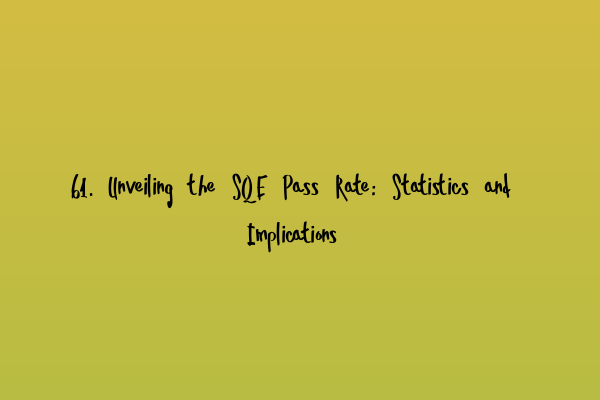Unveiling the SQE Pass Rate: Statistics and Implications
Are you considering taking the Solicitors Qualifying Examination (SQE) to embark on your legal career? Or perhaps you are a law firm or an educational institution following the developments in legal education closely. Either way, understanding the pass rate of the SQE and its implications is crucial in evaluating the effectiveness and significance of this new assessment.
In this blog post, we will dive deep into the pass rate statistics of the SQE and discuss the implications it has for aspiring solicitors, law firms, and legal education providers. Before we do that, let’s first understand what the SQE is and how it differs from the previous qualification route.
The Solicitors Qualifying Examination (SQE)
The SQE is a new assessment introduced by the Solicitors Regulation Authority (SRA) to replace the Qualified Lawyers Transfer Scheme (QLTS) and the Graduate Diploma in Law (GDL). It is designed to ensure that all solicitors meet consistent, high standards of knowledge and skills, regardless of their route to qualification.
The SQE is divided into two parts: SQE1 and SQE2. SQE1 tests a candidate’s functioning legal knowledge through multiple-choice questions (MCQs) and practical legal skills through written tasks. SQE2 focuses on practical legal skills through simulations and client interviewing exercises.
SQE Pass Rate Statistics
Now, let’s unveil the SQE pass rate statistics based on recent examination results. It’s important to note that these statistics are subject to change as more candidates sit for the exams and the SQE system matures further.
SQE1 Pass Rate
The pass rate for SQE1 varies depending on whether candidates have prepared through self-study or undertaken a preparation course. On average, candidates who have undergone SQE1 preparation courses tend to achieve a higher pass rate compared to those who have solely relied on self-study.
According to the latest data available, the overall pass rate for SQE1 ranges between 70% and 80%. Law firms and educational institutions play a crucial role in supporting candidates to achieve these pass rates by offering comprehensive preparation courses.
To increase your chances of success in SQE1, we recommend taking advantage of practice exam questions and practice mocks. You can find a wide range of SQE1 practice resources here and here, which will help you familiarize yourself with the exam format and assess your readiness for the assessment.
SQE2 Pass Rate
The pass rate for SQE2 is also affected by various factors, including the quality of preparation received, the level of practical experience, and individual competency. As SQE2 predominantly focuses on practical legal skills, candidates who have gained practical experience through internships, legal clinics, or law firm placements often achieve higher pass rates.
Based on the available data, the overall pass rate for SQE2 ranges between 60% and 70%. It is essential for candidates to undertake appropriate preparation courses, such as those offered by leading providers like SQE 2 Preparation Courses, to enhance their chances of success in this part of the assessment.
Implications of the SQE Pass Rate
The SQE pass rate has significant implications for aspiring solicitors, law firms, and legal education providers. A high pass rate indicates that candidates are adequately prepared and possess the necessary knowledge and skills to excel in their legal careers. It reflects positively on the effectiveness of educational courses and supports the SRA’s objective of maintaining high standards within the profession.
For aspiring solicitors, a high pass rate ensures that they are well-equipped to meet the demands and expectations of legal practice. It also reflects positively on their future job prospects, as law firms often prefer candidates who have demonstrated competency through a high pass rate in the SQE.
On the other hand, law firms can benefit from a higher SQE pass rate among candidates. They can be more confident in hiring solicitors who have successfully completed the SQE, as it guarantees a certain level of knowledge and skills. This ultimately contributes to improved client services and enhances the reputation of the firm.
Legal education providers, including law schools and training institutions, also have a vested interest in the SQE pass rate. A higher pass rate demonstrates the effectiveness of their programs and courses, making them more attractive to prospective students. It also strengthens their reputation within the legal community, attracting both aspiring solicitors and collaborations with law firms.
Stay Informed about SQE Exam Dates
If you are considering taking the SQE, it’s crucial to stay informed about the exam dates and registration deadlines. The SRA regularly updates the exam schedule, allowing candidates to plan their preparation and booking accordingly. You can find the latest SQE exam dates and important information here.
In conclusion, understanding the SQE pass rate and its implications is of paramount importance for aspiring solicitors, law firms, and legal education providers. While the pass rates mentioned in this blog post provide a snapshot of the current situation, they are subject to change as more candidates undertake the assessments. Therefore, it is crucial to stay informed and updated to make informed decisions about your SQE preparation and qualification journey.
